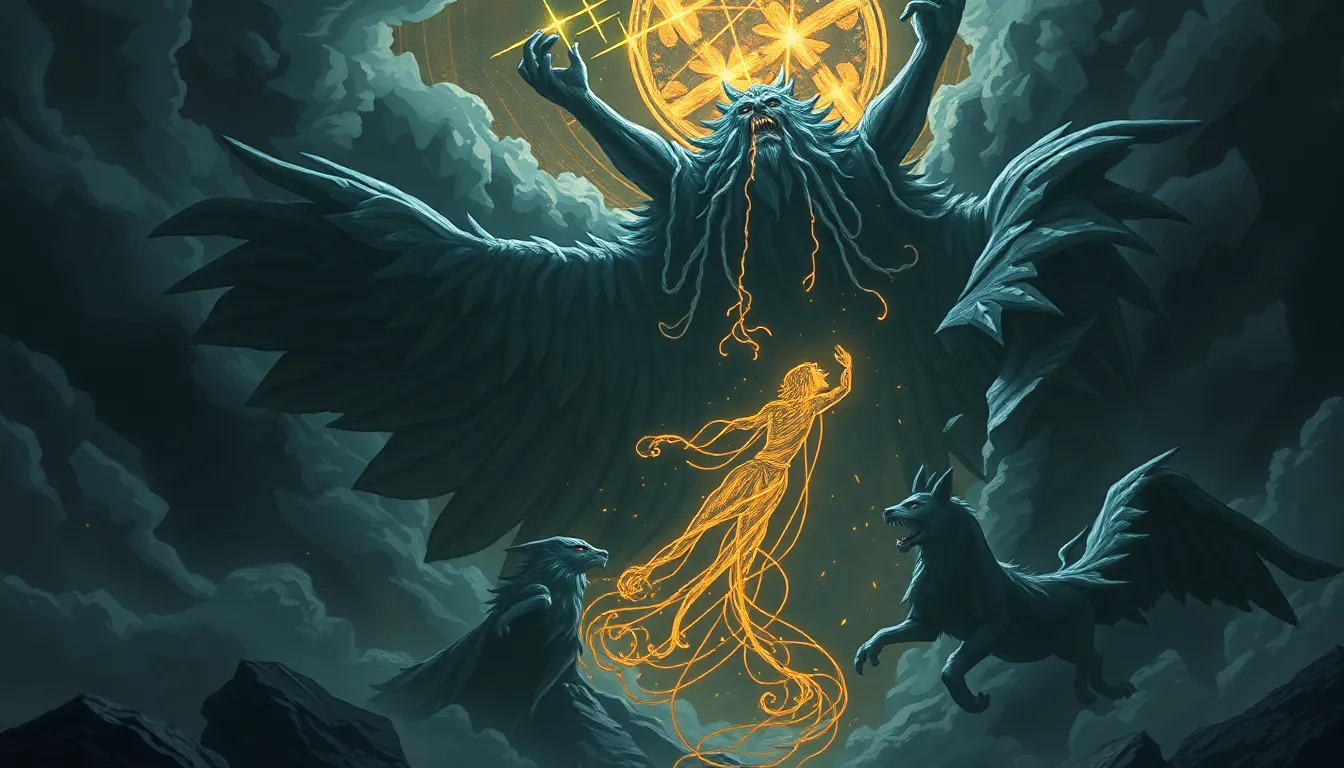The Price of Disobedience: Legendary Tales of Divine Punishment
I. Introduction
The concept of divine punishment has been a significant aspect of human understanding of morality and ethics throughout history. It serves as a mechanism for enforcing social norms and religious laws, providing a framework for understanding the consequences of disobedience to divine will.
In various cultures and religions, obedience is often deemed a virtue, while disobedience is viewed as a grave sin that incurs divine wrath. The stories of individuals facing the consequences of their actions serve as cautionary tales, reminding followers of the importance of adhering to spiritual and moral guidelines.
This article will explore the historical context of divine punishment, folkloric tales illustrating disobedience, psychological impacts, cultural comparisons, and modern interpretations. Through this exploration, we seek to understand the enduring significance of these narratives in shaping moral behavior.
II. Historical Context of Divine Punishment
A. Ancient civilizations and their views on disobedience
1. Mesopotamian beliefs
In ancient Mesopotamia, disobedience to the gods was believed to result in catastrophic consequences. The Sumerians, Akkadians, Babylonians, and Assyrians all had elaborate mythologies that stressed the importance of respecting divine authority. The epic of Gilgamesh, for example, illustrates the consequences of defying the will of the gods.
2. Egyptian mythology
Similarly, ancient Egyptians had a deep reverence for Ma’at, the concept of truth, order, and cosmic balance. Disobedience to Ma’at was met with severe repercussions, including divine retribution in the afterlife. The story of Osiris, who faced betrayal and disobedience, highlights the significance of upholding divine order.
B. Religious texts and their teachings on punishment
1. The Bible
The Bible contains numerous examples of divine punishment for disobedience. The story of Adam and Eve serves as a foundational tale, where disobedience leads to expulsion from Eden. Similarly, the flood narrative in Genesis reflects the consequences of humanity’s wickedness.
2. The Quran
The Quran also emphasizes divine punishment for those who stray from the path of righteousness. Stories of past prophets, such as Noah and Lot, illustrate the dire consequences faced by communities that reject divine guidance.
3. Other sacred texts
Many other sacred texts across various religions contain similar themes, reinforcing the idea that disobedience to divine will leads to punishment, often in the form of calamities or moral decay.
III. Folkloric Tales of Disobedience
A. Overview of global folklore and its moral lessons
Folklore from around the world is rich with tales that convey moral lessons about obedience and the consequences of disobedience. These stories often serve as allegories for societal values, reflecting the cultural importance placed on adhering to moral codes.
B. Prominent tales illustrating the consequences of disobedience
- The tale of Prometheus: In Greek mythology, Prometheus defies Zeus by stealing fire and giving it to humanity. His punishment is eternal torment, illustrating the severe consequences of challenging divine authority.
- The story of Lot’s wife: In the Biblical account, Lot’s wife disobeys a divine command not to look back at the burning city of Sodom and is turned into a pillar of salt. This tale underscores the importance of obedience and the dangers of temptation.
- The legend of Icarus: Icarus, in Greek mythology, ignores his father Daedalus’s warnings about flying too close to the sun. His disobedience leads to his tragic fall, symbolizing the peril of hubris and ignoring wise counsel.
IV. The Psychological Impact of Divine Punishment
A. The fear of divine retribution as a deterrent
The concept of divine punishment plays a crucial role in deterring individuals from engaging in immoral or disobedient behavior. The fear of retribution can lead to a more compliant society, as people strive to align their actions with divine expectations.
B. Impact on individual behavior and societal norms
Belief in divine punishment can instill a sense of accountability and ethical responsibility. Societies that emphasize divine oversight often demonstrate lower rates of crime and a stronger adherence to communal values.
C. Case studies from different cultures
In cultures where divine retribution is a prevalent belief, such as in many religious communities, individuals often report higher levels of moral behavior. For instance, in certain Indigenous cultures, the belief in ancestral spirits watching over the community reinforces social norms and discourages wrongdoing.
V. Disobedience in Mythology
A. Greek mythology and the theme of hubris
Greek mythology is replete with tales where disobedience, often characterized by hubris, leads to dire consequences. Characters such as Narcissus and Arachne serve as reminders that defiance against the gods results in severe punishments.
B. Norse myths and the consequences faced by disobedient gods
Norse mythology also reflects this theme, where disobedience among gods leads to catastrophic events, such as Ragnarok, the end of the world. Loki’s betrayal of the gods exemplifies the chaos that follows disobedience to divine order.
C. Hindu epics that illustrate divine retribution
In Hindu epics like the Mahabharata and Ramayana, characters face divine punishment for their transgressions. The consequences of disobedience often serve as moral lessons, reinforcing the importance of dharma (righteousness) in one’s life.
VI. Comparative Analysis of Divine Punishment Across Cultures
A. Similarities in narratives and themes
A comparative analysis reveals that most cultures share common narratives about divine punishment. Themes of hubris, moral failure, and the need for obedience transcend cultural boundaries, illustrating a universal understanding of these concepts.
B. Differences in the portrayal of deities and punishments
Despite the similarities, the portrayal of deities and the nature of punishments can vary significantly. For instance, in some cultures, deities exhibit mercy, while in others, they are depicted as vengeful and unforgiving.
C. Cultural significance and interpretations
The cultural significance of divine punishment narratives often reflects societal values and historical contexts. Understanding these interpretations can provide insight into the moral frameworks of different civilizations.
VII. Modern Interpretations of Divine Punishment
A. How contemporary society views disobedience
In modern society, the interpretation of divine punishment has evolved. While some still adhere to traditional beliefs, many view disobedience through a more secular lens, focusing on legal and ethical consequences rather than divine retribution.
B. The role of religion in modern punishment narratives
Religion continues to play a significant role in shaping narratives around punishment. Many religious communities still emphasize obedience to divine laws, which can influence social norms and legal frameworks.
C. Examples from literature, film, and media
Contemporary literature and media often explore themes of divine punishment, reflecting society’s ongoing fascination with morality and justice. Films and novels frequently depict characters facing the consequences of their actions, drawing parallels to classical tales of disobedience.
VIII. The Role of Forgiveness and Redemption
A. Exploring themes of mercy and forgiveness in divine narratives
While divine punishment is a common theme, many narratives also explore the concepts of mercy and forgiveness. These stories remind us that even in the face of disobedience, redemption is possible.
B. The possibility of redemption after punishment
Many religious traditions emphasize the potential for redemption after punishment, illustrating the belief that individuals can seek forgiveness and reconcile with the divine.
C. Case studies of figures who found forgiveness
Figures such as King David from the Bible, who faced severe consequences for his actions yet found forgiveness, demonstrate the complex interplay between punishment and redemption in religious narratives.
IX. Lessons Learned from Legendary Tales
A. Moral and ethical implications of disobedience
The tales of divine punishment impart critical moral and ethical lessons. They emphasize the need for accountability, the importance of following divine guidance, and the potential consequences of straying from the path of righteousness.
B. Application of these lessons in contemporary life
In contemporary



